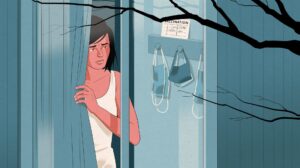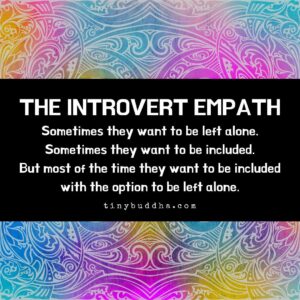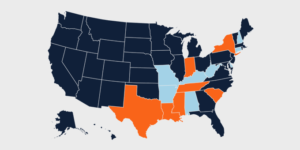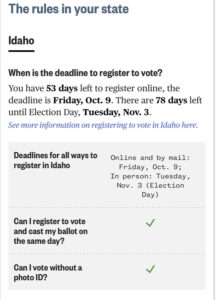NBC
The shift.
May 7, 2021Suddenly, today, I panicked about life inching back toward “normal.” I don’t want to travel endlessly for work. I don’t want my weekends to be over-committed with activities. I don’t want to miss bedtime with my kid. I don’t want to wear blazers — or, hell, even shoes.
-Emily Ramshaw, Co-founder & CEO 19th News.
For many of us the prospect of being is terrifying and so we go on saying, “I’m good” when in fact we are struggling or overwhelmed. This allegiance to the social convention that everything is okay is fatiguing and prevents us from receiving care and building deep connections with others. David Whyte, a Poet, writes, “in refusing our vulnerability we refuse the help needed at every turn of our existence and immobilize the essential, tidal and conversational foundations of our identity.”
-Ryan Redman, The Flourish Foundation
NEW: ‘The Centers for Disease Control and Prevention now states explicitly — in large, bold lettering — that airborne virus can be inhaled even when one is more than six feet away from an infected individual. “If you’re in a poorly ventilated environment, virus is going to build up in the air, and everyone who’s in that room is going to be exposed.” [Friday, May 7th]
The Guardian
Fears Covid anxiety syndrome could stop people reintegrating
Natalie Grover Science correspondent
Scientists have expressed concern that residual anxiety over coronavirus may have led some people to develop compulsive hygiene habits that could prevent them from reintegrating into the outside world, even though Covid hospitalisations and deaths in the UK are coming down.
The concept of “Covid anxiety syndrome” was first theorised by professors last year, when Ana Nikčević, of Kingston University, and Marcantonio Spada, at London South Bank University, noticed people were developing a particular set of traits in response to Covid.
The anxiety syndrome is characterised by compulsively checking for symptoms of Covid, avoidance of public places, and obsessive cleaning, a pattern of “maladaptive behaviours” adopted when the pandemic started. Now researchers have raised the alarm that the obsessive worrying and threat avoidance, including being unwilling to take public transport or bleaching your home for hours, will not subside easily, even as Covid is controlled.
“Fear is normal. You and I are supposed to fear the virus because it’s dangerous. The difference, however, in terms of developing a psychopathological response is whether you end up behaving in … overly safe ways that lock you into the fear,” said Spada. “My expectation is we’re going to have … chunks of the population that are avoiding re-engagement and constantly worrying about the virus for months to come, whether they are vaccinated or not.”
Dr Giovanni Mansueto, of the University of Florence, is investigating the syndrome in Italy and says he has seen some evidence of it in his clinical practice. It was important not only to identify the syndrome but to find ways to treat and prevent it, he said, “otherwise, this could be a big problem”.
Even after being fully vaccinated, many still wrestle with a fear of catching Covid
“I don’t want to be sitting in a movie theater with ‘patient zero’ of a variant that bucks the vaccine.”
NBC
By Elizabeth Chuck
Since the start of the pandemic, Kit Breshears has been terrified of catching the coronavirus. Getting vaccinated did not magically change that.
For the past 13 months, Breshears, 44, of Buffalo, Minnesota, has not stepped foot inside a store or restaurant, not even to pick up a takeout meal. Any visits with family and friends have been over Zoom.
When he received his second Covid-19 shot earlier this month, he felt relief, he said — but with the pandemic still ongoing, he has found it impossible to turn off his anxiety.
“My fear is that enough people are not going to get vaccinated, or they’re not going to get vaccinated in a timely fashion, and we end up getting a horrible variant that puts us right back to where we are,” Breshears, a communications director at a local university, said. “I don’t want to be sitting in a movie theater with ‘patient zero’ of a variant that bucks the vaccine.”
With more than 93 million people, or more than a quarter of America, fully vaccinated, two camps have emerged: those making up for lost time in the form of house parties, happy hours and travel, and those who cannot shake the fear that they may still get the coronavirus.
Breshears is far from the only one in the latter category. A survey released last month by the American Psychological Association found that 48 percent of adults who have been vaccinated said they felt “uneasy” about returning to in-person interactions once the pandemic is over.
For the time being, some timidness is a good thing, public health experts say.
“We’re still involved in the disease containment phase of the pandemic,” said Tener Goodwin Veenema, a professor and visiting scholar at the Johns Hopkins Center for Health Security. Fully vaccinated individuals should feel confident in the protection they have received, she said, but should still wear their masks in public and avoid big groups of unmasked people.
Nonetheless, for healthy, fully vaccinated people, the fear of catching Covid-19 should not be paralyzing, said Vaile Wright, a clinical psychologist and the senior director of health care innovation at the American Psychological Association.
“With previous pandemics, like SARS and Ebola, we have seen agoraphobia,” she said, referring to the anxiety disorder in which people fear certain situations so much that they may not leave their homes. “At the end of the day, if you’re really, really struggling, then it’s time to seek out some professional help.”
“There is going to be this lingering sense of anxiety going forward, because uncertainty still remains.”
“Recognize that the other person might just not be where you’re at yet, and that doesn’t make them wrong,” Wright said.
If you are feeling anxious about doing things that fall within safe CDC guidelines for fully vaccinated people, Wright suggests identifying small steps that you can take.
“There are people who haven’t gone to the grocery store in a year. Grocery stores are pretty safe if you’re wearing masks, so maybe that’s step one,” she said. “And then maybe move up to lunch outside with a friend who is also fully vaccinated.”
https://www.nbcnews.com/news/amp/ncna1265086
AXIOS/Charlotte
How an extroverted introvert like myself manages post-pandemic anxiety
By
In 2019, I wrote this piece about being an extroverted introvert. Back then, I found myself toeing the line when it came to my tendencies and preferred ways to socialize. More than two million people read it, so it seemed as if others could relate.
But two years and one pandemic later, and I’ve found myself more on the introverted side of the fence.
Why it matters: The pandemic has changed all of us in some way, whether we picked up a new hobby, strengthened or lost friendships, or got clarity on our future plans.
- These shifts will only become more apparent as the world starts to reopen.
The bright side: The past year has allowed me to adopt a slower-paced lifestyle filled with more intentional connections and commitments. It’s felt like the perfect way to recharge my introvert batteries without getting hit with a case of FOMO at every turn, and I don’t want to immediately jump back into my full-tilt, non-stop schedule.
But, as more of us get vaccinated and normal life is in sight, I’m struggling with mixed feelings.
The state of play: First and foremost, I’m feeling relief on so many levels. That goes without saying.
-
I’m feeling excited about getting to enjoy my favorite pre-pandemic activities again: meeting friends on the patio at NoDa Company Store, spontaneously popping into Paper Skyscraper between meetings, date nights out with my husband.
Yes, but: Coupled with my relief and excitement comes anxiety.
-
I feel out of practice when it comes to socializing with people I haven’t seen in a while, particularly in large groups. I’ve gotten used to my small “quarantine pod,” and I’m anxious about how I’ll re-develop those socializing muscles.
-
I’ve loved not feeling obligated to pack my schedule full until I’m scrambling to play catch-up on Sunday evenings.
There’s also a part of me that wonders if living through a pandemic will leave me permanently focused on health issues. You don’t realize how germy public spaces are until you spend a year obsessing about it, and I wonder if I’ll be able to shut that part of my brain off.
Tips for coping:
If you’re like me and are experiencing a plethora of feelings as we prepare to re-enter the real world, Leah Finch, a licensed clinical mental health counselor and owner of Goldfinch Counseling and Coaching, has some tips:
(1) Know that it’s OK to feel this way: “I think the most helpful thing is an acknowledgment that this is all so normal. It’s not just you. You’re not an anxious person, you’re a person who is experiencing normal and natural worries,” Finch says.
(2) Rely on the coping mechanisms you’ve developed: We’ve all had to find new ways to soothe ourselves during a stressful year, and Finch says it’s important to continue to utilize these strategies as we reacquaint ourselves with our pre-COVID lives.
- “That may be taking a few deep breaths or doing some stretches to calm the body and the mind.”
(3) Don’t focus on eliminating anxiety completely: Unfortunately, if your end goal is to make your anxiety totally disappear forever, you’ll only end up frustrated, Finch says. Everyone faces the occasional bout of anxiety. It’s part of being human.
- But if this anxiety impedes your ability to enjoy life, Finch recommends asking yourself, “Are these thoughts helping or hurting me?’” This can help you identify detrimental patterns so you can get out of that unproductive thought loop.
(4) Mental health isn’t linear: If you’re a person who normally has your anxiety well-managed, finding yourself facing anxious thought patterns again can be discouraging. You might fear that you’re regressing or that your work has gone to waste.
- “Remind yourself that mental health isn’t linear. It’s a journey,” Finch says. “If you’re experiencing symptoms, know that you’re not regressing, you’re just learning how to relate to your anxiety in new ways. You are not your anxiety. It doesn’t have control over you.”
(5) Soak in the moments when you’re feeling good: “The flip side of acknowledging that anxiety is normal is being really mindful of moments where you’re not feeling anxious and allowing yourself to experience that moment. What does your body feel like? What are your sensations?” Finch says.
Cut each other some slack as we head back into the world.
We’ve just been through a collective trauma, and it’s inevitably changed us all in one way or another.
Be patient with yourself and with the people you love as you find your footing and learn how to connect with each other again.
#VOTE
August 18, 2020We must.
“We have got to grab our comfortable shoes, put on our masks, pack a brown bag dinner and maybe breakfast too because we’ve got to be willing to stand in line all night if we have to.”
-Michelle Obama
From NBC:
“Mark your calendars. Everything you need to know about mail-in and early in-person voting, including the first day you can cast your ballot in the 2020 election.”
P L A N Y O U R V O T E





